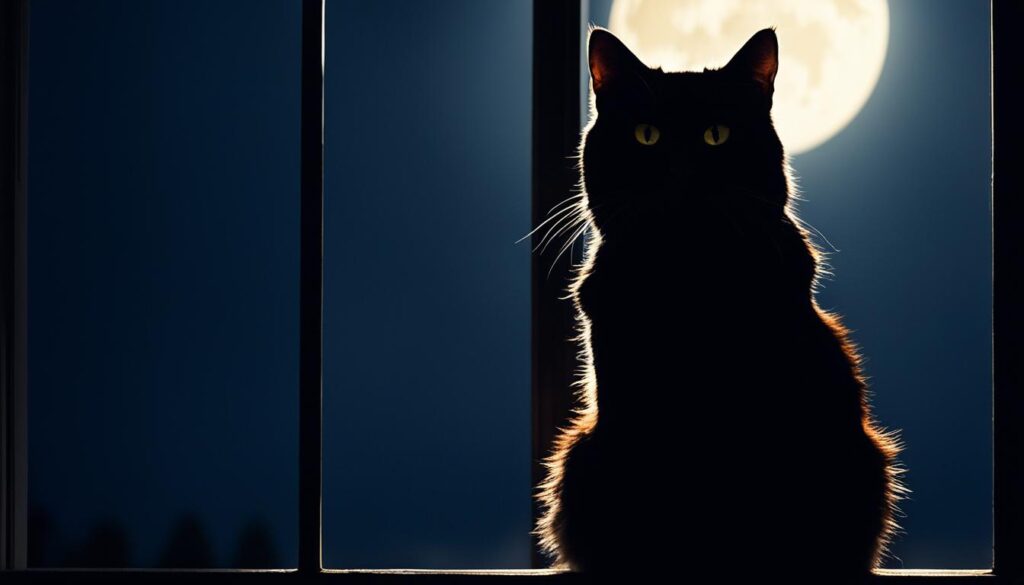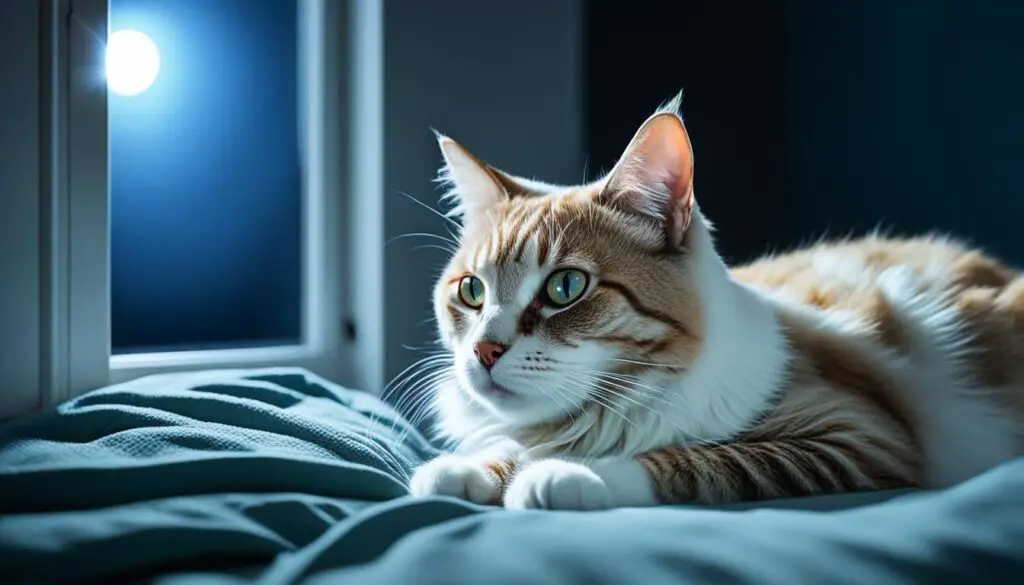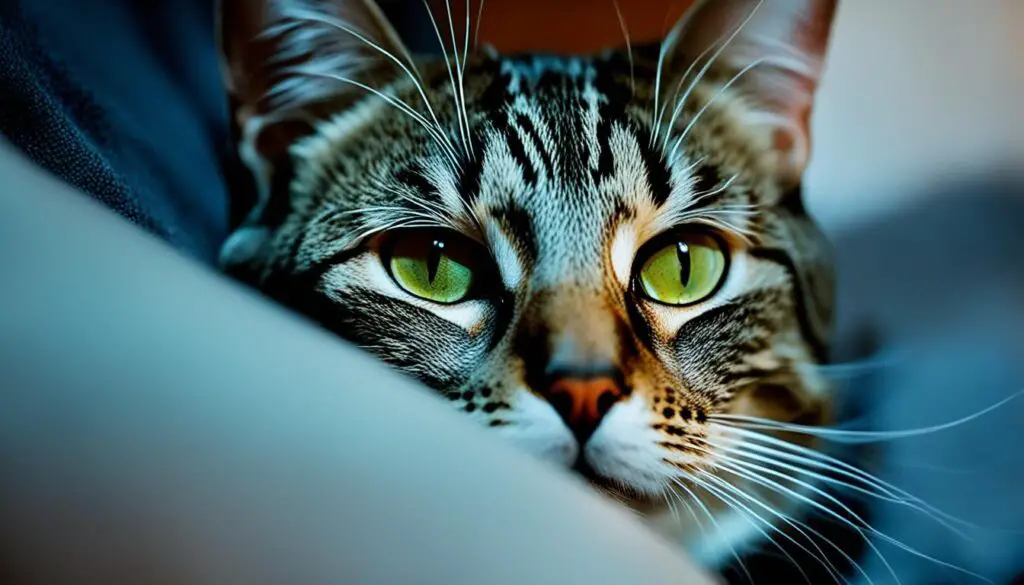As I lay under the covers, my cat, Luna, quietly entered the bedroom. She moved carefully, her eyes on me. Then, she sniffed my face and touched my arm gently. After a quick check, she went to her spot on the windowsill. I wondered – does my cat really check if I’m breathing while I sleep?
This behavior makes cat owners curious. It makes us think about our cats and their watchful eyes at night. Are they really worried about us, or is there another reason? As a cat lover, I want to find out why cats do this.
Key Takeaways:
- Cats may check on their owners’ breathing during sleep, potentially out of concern or curiosity
- Feline behavior at night can be influenced by factors like hunger, boredom, or a desire for attention
- Understanding your cat’s sleeping patterns and habits can help prevent early morning disturbances
- Cats are crepuscular, meaning they are most active at dawn and dusk, which may contribute to their nighttime behavior
- Providing adequate play, food, and a comfortable environment can help satisfy your cat’s needs and reduce disruptive behaviors
Introduction to Cat Behavior at Night
Cats are fascinating creatures, especially at night. They show unique behaviors when the sun sets. Knowing what they do at night can tell us a lot about their personalities. It also helps us bond better with our cats.
Personal Experience of a Cat Owner
I’m a cat owner who loves watching my cat at night. My cat, Whiskers, is a Ragdoll who loves being close to me in the evening. Unlike some cats, Whiskers likes to snuggle with me when I sleep.
Whiskers is very attentive in the early morning. He gently wakes me up with a soft meow or a touch of his paw. It makes me think, “Do cats check if we’re breathing at night?” The answer is complex, as cats sleep differently than humans.

Learning about cat behavior at night helps us understand their unique bond with us. By knowing their sleeping habits and why they act certain ways at night, we can meet their needs better. This strengthens our connection with our cats, making our relationship more harmonious.
Do cats really check you at night to see if you are breathing?
Cats have a special way of acting at night that catches our attention. Many think they check on us to make sure we’re alive. But, since we can’t talk to them, we’re not sure why they do this. Still, we can guess a bit about how cats perceive human sleep patterns and behavior.
Cats pay close attention to our daily lives, including our sleep. They notice small changes in how we sleep, breathe, and move. This helps them know when it’s time to wake up and start their day, like asking for food or playing.
A normal cat breathes 20 to 30 times a minute. If a cat breathes less than 30 times a minute, it might be sick. Breathing more than 30 times a minute while sleeping could mean a health issue, like heart problems. Watching a cat’s breathing can help spot health problems early.
So, cats might not really check if you’re breathing on purpose. But, they can sense changes in how you sleep. This makes them come over to you at night. Their reasons include being hungry, wanting attention, being curious, and knowing your daily habits.

The way cats and their owners sleep together is really interesting. Understanding this can make us value our bond with our cats more.
Understanding Your Cat’s Routine
Cats love their routines and have an internal clock. After a few weeks with your cat, you’ll see they get your daily habits. They start to match their routine with yours.
Cats are creatures of habit
Cats pay close attention to their surroundings and the people in them. They quickly pick up on your daily life, from morning till night. This lets them plan their day around yours.
Recognizing your daily patterns
Your cat sees you as their top person. They want to be with you and join in your daily life. They notice when you’re about to wake up, using your sleep patterns.
This lets your cat adjust their cat daily routines to match your cat’s internal clock and cat’s awareness of owner’s habits.
As your cat gets used to your schedule, they’ll copy your habits. They might sleep more during the day or be more awake at night. This makes them feel safe and happy at home.
Knowing your cat’s daily habits and how they match yours helps you meet their needs. It makes living together easier for both of you.
Signs Your Cat Senses You’re About to Wake Up
Cats are very aware of how humans sleep. They watch us as we fall asleep and wake up. They notice small changes that mean we’re about to wake.
When you’re about to wake up, your cat might act differently. They might become more alert and start moving around. They might even meow, paw at you, or sit by your face, waiting for you to wake up.
Cats can tell when you’re moving from deep sleep to lighter sleep. They notice changes in your breathing. This tells them it’s time to get ready for you to wake up.
Your cat also notices when you’re moving in your sleep. They can see even the smallest movements. This includes twitches, changes in how you’re lying, or when your eyelids move. These signs tell them you’re getting ready to wake up.
Your cat pays attention to your sleep patterns. They know when you’re about to wake up. This shows how connected cats and humans can become.
Reasons Why Cats Wake You Up in the Morning
Many of us wake up hungry after hours without eating. Cats feel the same way in the morning, leading to their early-morning excitement. If you wake up to your cat looking at you, they’re not plotting against you. They just want their food bowl filled.
Cats are crepuscular, meaning they’re most active at dawn and dusk. They can’t wait for you to wake up for playtime. They’ll watch for any sign of movement, seeing your wake-up as a chance for a new day of fun.
Your Cat is Hungry
Cats often wake their owners in the morning because they’re hungry. Like us, they get hungry after several hours without eating. They see their sleeping owner as a way to get food.
Morning is Peak Activity Time for Cats
Aside from hunger, cats wake up in the morning because of their crepuscular nature. They’re most active at dawn and dusk, times they’d hunt in the wild. As their internal clock signals a new day, they want to play, explore, and get your attention.
Knowing why your cat wakes you up in the morning can help you manage their behavior. By feeding them and giving them things to do, you can make mornings smoother. This way, you and your cat can get along better.
Tell-Tale Signs Your Cat is Trying to Wake You Up
Humans and cats don’t always speak the same language. But, there are signs that show your cat might be trying to wake you. Look for loud meowing, pawing, or even knocking things over.
Loud Meowing
Loud, persistent meowing is a clear sign your cat wants your attention. They might be hungry or ready to play. If their meows are loud and won’t stop, they’re probably trying to wake you.
Pawing Your Face or Kneading Your Body
When your cat paws at your face or body, it’s a sign they’re trying to wake you. This behavior shows love and a desire for interaction.
Scratching Bed Covers or Knocking Items Over
Scratching bed covers or knocking things over might mean your cat wants to wake you. Cats scratch to get your attention or because they’re bored.
These behaviors can be frustrating, but they’re natural for cats. Understanding what your cat is trying to say helps you meet their needs. It’s key to know when your cat is trying to wake you up.
Why Does My Cat Stare at Me While I Sleep?
Ever woken up to find your cat staring at you? This behavior can mean many things, from basic needs to a deep bond with you.
Hunger or Wanting Food
Cats often stare at their owners when they’re hungry. They might be waiting for their next meal. If they’re meowing or pacing, they’re telling you it’s time for breakfast.
Desire to Play
Cats love to play, especially in the morning. They might see you as a playmate. They stare hoping to start a game or playtime.
Expressing Love and Affection
Some cats stare to show love and affection. They might purr, head butt, or seem happy near you. They enjoy being close and comfortable with you while you sleep.
Knowing why your cat stares can help you meet their needs. Watch their body language to understand them better. This can make your bond stronger.
Cats are complex, and their stares can mean different things. If you’re worried about your cat’s staring, talk to your vet.
Stopping Your Cat from Waking You Up Early
If your cat wakes you up too early, there are ways to help. You can try different things to change their morning routine. This can make sleeping better for you and your cat.
Use an Automatic Feeder
Using an automatic feeder can stop your cat from waking you for food. These feeders give out food at set times. So, your cat eats without waking you up.
Tire Your Cat Out Before Bedtime
Make sure your cat is tired before bed. A tired cat won’t wake you up early. Play with them using toys or a wand to help them sleep well.
Provide Toys and Stuffed Animals
Give your cat toys and stuffed animals to keep them busy at night. These can distract them from waking you. They’ll be happy playing and won’t bother you.
Try these tips to stop your cat from waking you early. Be patient and keep trying, and you’ll sleep better soon.
Health Concerns When Cats Stare Excessively
If your cat stares at you more than usual, it might mean they’re not feeling well. They could be in pain, anxious, or having cognitive problems. Changes in their behavior, like staring more, are often a sign of health issues.
Cats hide illness well, so watch for any changes in their habits. If your cat starts staring at you while you sleep, see a vet. This could mean they’re not okay.
Some health issues make cats stare a lot, including:
- Pain or discomfort: Cats stare to show they’re in pain or discomfort. This could be from arthritis, dental problems, or other health issues.
- Anxiety or stress: Changes in their home or routine can make cats anxious. This anxiety might show as a lot of staring.
- Cognitive dysfunction: Older cats can get cognitive problems like dementia. This can make them stare more often.
If your cat stares a lot, see a vet for a check-up. The vet can find out what’s wrong and treat it. Catching health problems early helps keep your cat happy and healthy.
Remember, vet visits for cat behavior changes are key for your cat’s health. Paying attention to their behavior and getting vet care when needed keeps them happy and healthy with you.
The Science Behind Cat Vision and Sleep Patterns
Cats are fascinating creatures with unique biology and behavior. Their vision and sleep patterns are remarkable. They stand out from humans in many ways.
Cat Vision: Cats have amazing visual acuity. They can see well in low light and spot subtle movements. Their eyes are made for their crepuscular nature, being most active at dawn and dusk.
They have more rod cells in their retinas, helping them see better in dim light. Their eyes also have a reflective layer called the tapetum lucidum. This layer bounces light back through the retina, improving their night vision.
Cat Sleep Patterns: Cats sleep a lot, about 13 hours a day on average. Their sleep is linked to their natural hunting and foraging times, which happen in the early morning and late evening.
They are polyphasic sleepers, meaning they have multiple sleep-wake cycles during the day. This is different from humans, who have one long sleep period.
- Cats have a unique sleep pattern, with periods of light sleep and short deep sleep bursts.
- Their sleep-wake cycle is influenced by their cat’s biological rhythms and cat’s sensory perception, fitting their crepuscular lifestyle.
- Cats rest and sleep a lot during the day, which is key for their cat vision and health.
Learning about cat vision and cat sleep patterns helps us appreciate these feline friends more. It shows us their unique biology and how they see the world. This knowledge helps us care for them better.
Cat Myths and Legends About Breathing
Throughout history, cats have been the focus of many myths and legends. People believe cats can sense or monitor human breathing at night. These ideas show how much we find cats mysterious and fascinating.
One old story says cats steal a baby’s breath while the baby sleeps. This idea has lasted for centuries, even though experts say it’s not true. Some parents claim cats took their baby’s breath, but these stories often lack solid proof.
These myths stick around because of negative cat stereotypes and the power of shared stories. Parents’ fear of harm to their babies also keeps this cat myth alive.
But science tells us more about cats than these old tales. For example, a study at the University of Sussex found cats purr in different ways. They also don’t always land on their feet, and some cats like water, like the Turkish Van or Bengal breeds.
Exploring cat folklore helps us understand the line between truth and myth. By looking into the origins of these stories, we learn more about cats’ true nature and behavior.
Tips for New Cat Owners
Becoming a new cat owner is exciting and rewarding. It also comes with responsibilities. Understanding your cat’s behavior and setting a healthy routine are key tips for new owners.
Patience and observation are crucial. Cats have unique personalities and need time to adjust. By being patient and observant, you can understand your cat’s needs and preferences. This helps build a strong bond.
- Provide playtime and enrichment for your cat. Cats are curious and active. Regular play keeps them physically and mentally fit.
- Stick to a consistent feeding schedule. This meets your cat’s nutritional needs and stops begging during meals.
- Pay attention to your cat’s behavioral cues and needs. If you have health concerns, don’t hesitate to get vet advice.
Being a cat owner is rewarding but each cat is different. Tailor your approach to your cat’s needs for a strong bond. This ensures a happy, healthy life for your cat.
Cat care advice and behavior management are key for new owners. With patience, understanding, and a commitment to your cat’s wellbeing, you can have a fulfilling cat ownership journey. You’ll give your cat the care and attention they deserve.
Conclusion
We may not fully understand how much our cats know about our breathing or sleep. But it’s clear they pay close attention to our daily lives. They use different behaviors to wake us up and connect with us. By understanding why our cats act the way they do at night, we can manage their morning habits better.
Accepting our cats’ unique behaviors can strengthen our bond with them. This article showed us how fascinating our cats are. They have a great sense of smell, can hear very well, and know our voices and routines. By knowing these things, we can appreciate our cats more and see their value in our lives.
Thinking about this article, it’s clear our cats are more than pets. They are part of our families, forming deep emotional bonds with us. They enrich our lives in many ways. Let’s cherish these relationships and keep trying to understand and meet our cats’ needs.
FAQ
Do cats really check you at night to see if you are breathing?
We can’t be sure if cats wake us up to check our breathing. But, they know our daily routines well. They notice changes in our sleep patterns and breathing, signaling it’s time to wake up.
How does my cat know when I wake up?
Cats understand human sleep patterns, including breathing and body movements. They use these signs to guess when you’ll wake up. They pay attention to your body and breathing changes that mean you’re waking soon.
Why does my cat stare at me while I sleep?
Cats stare at their owners for many reasons, like being hungry or wanting to play. They might also stare as a sign of love. If staring is too much or with other odd signs, see a vet to check for health issues.
How can I stop my cat from waking me up early?
Try using an automatic feeder to keep your cat fed all night. Tire your cat out with play before bed. Also, give them toys and stuffed animals to keep them busy and away from you.
Why do cats have exceptional vision and sleep patterns?
Cats can see well in low light and spot small movements. Their eyes are made for their active times at dawn and dusk. They sleep a lot, about 13 hours a day, which fits their hunting and foraging habits.

Comments